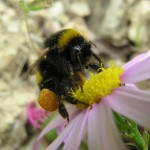by Catherine Haug, February 9, 2014; updated Feb 27,2014 regarding monarch butterflies
Our pollinators, especially bees, are in trouble, dying in great numbers. The situation is getting so severe that growers are concerned their crops will soon lose the ability to to produce seed for future crops, because of the decline in healthy pollinators. This affects almost all vegetables – including squash, tomatoes, greens, cabbage, broccoli, carrots, beets, beans, peas, etc.; and many fruits – including huckleberries and other berries, apples, pears, peaches, apricots, plums, melons and more.
Update: We are also losing another valuable pollinator to the effects of GMO crops: the Monarch Butterfly. This beautiful animal feeds only upon milkweed in its youth, but the spraying of GMO crops with Roundup and other herbicides is killing off all the milkweed. You can help by growing this flowering plant in your yard or garden. See Monarch Watch: Growing Milkweed.
But there is something you can do – every one of you – to help not only the plight of pollinators and our food supply, but also for the health of your family. (more…)


